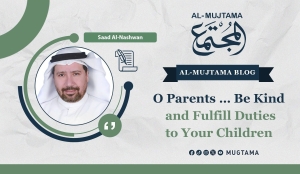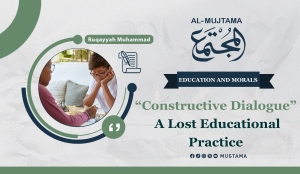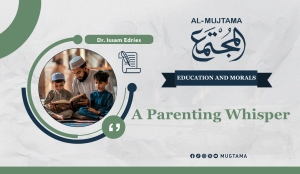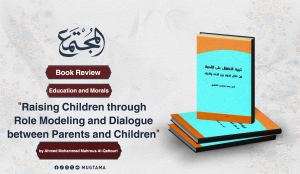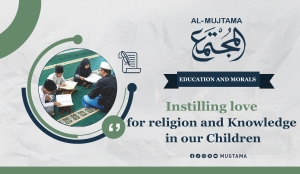O Parents… Be Kind and Fulfill Duties to Your Children
February 04, 2025The title of this article may seem reversed, but it is intentional. Usually, children are expected to be dutiful their parents, a message frequently conveyed in Friday sermons, mosque lessons, and educational programs on television and radio. However, it is rare to hear demands for parents to be dutiful to their children.
Here, we do not mean material care—providing food, clothing, and life necessities—but rather moral and value-based care. Parents should nurture their children's values just as they ensure their nourishment.
Our role model, Prophet Muhammad (peace and blessings be upon him), exemplified this when he said to Abdullah ibn Abbas: "O boy! I will instruct you in some matters. Be watchful of Allah (Commandments of Allah), He will preserve you. Safeguard His Rights, He will be ever with you. If you beg, beg of Him Alone; and if you need assistance, supplicate to Allah Alone for help. And remember that if all the people gather to benefit you, they will not be able to benefit you except that which Allah had foreordained (for you); and if all of them gather to do harm to you, they will not be able to afflict you with anything other than that which Allah had pre-destined against you. The pens had been lifted and the ink had dried up."
With these words, the Prophet (peace and blessings be upon him) instilled firm faith, fear of Allah, and a sense of accountability in the heart of this young boy.
Similarly, the companion Umar ibn Abi Salamah (may Allah be pleased with him) narrated: "I was a young boy under the care of the Messenger of Allah (peace and blessings be upon him), and my hand used to roam around the plate. So the Messenger of Allah (peace and blessings be upon him) said to me: ‘Dear child, mention Allah's Name, eat with your right hand, and eat from what is next to you."
These hadiths highlight the importance of proper upbringing beyond merely providing food and drink.
Parental duty toward children is not just about words but also about setting a good example. This includes allowing children to accompany their parents to gatherings and social events. As the saying goes, “Gatherings are schools.” A child learns when to speak, how to sit, and when to leave. Likewise, a daughter accompanying her mother to women’s gatherings learns modesty, appropriate conversation, and other essential aspects of womanhood.
Parents are the mirror of their children. As the poet Al-Ma'arri said: "A young boy grows up according to what his father accustomed him to,
And his close ones shape his religious devotion, not his own reasoning."
Similarly, the saying “Education in childhood is like engraving on stone” emphasizes that early teachings remain ingrained in a child's memory for life.
Children are like empty vessels. If left to social media and electronic games under the pretext of parental busyness—especially during family visits—the consequences can be harmful. Instead, children should be encouraged to play and interact with their peers from family and neighbors. The moral and health risks of excessive exposure to electronic games are well-known.
One of the greatest parental failings is leaving children in the care of nannies, whether Muslim or non-Muslim, without knowing what values they are instilling. Surveillance cameras are not enough to monitor domestic workers or drivers. I recall an incident during my time as a teacher when a parent approached me, requesting that his son pass the Arabic language course despite his extreme weakness in the subject. When I asked who was tutoring the child at home, I was shocked by the father’s response: their housemaid, an Asian worker, was the one teaching him! I immediately declined to continue the conversation, and the boy did not pass the course.
If we want our children to honor us, we must first instill in them strong values, religious principles, and moral foundations, beginning with choosing a righteous mother to raise them properly.
-------------------------------------------------------------
“Constructive Dialogue” A Lost Educational Practice
February 02, 2025Today, humans live in an era filled with trials and challenges. Life moves at a rapid pace, and people’s hearts are burdened by material demands imposed upon them. Their free time is often spent moving between virtual worlds under the pretext of social communication, without realizing that real connections are being severed in their absence. As a result, genuine communication with oneself and one’s family—before even considering others—has been lost.
To protect oneself and one's family from the negative effects of this reality, it is essential to establish a strong familial bond, with constructive dialogue being one of its most important tools. Let us explore its significance and its powerful role in shaping the character of children.
The Importance of Dialogue
Anyone who reflects on the Qur'an and Sunnah will notice their emphasis on dialogue as a means of guiding individuals toward the truth. Dialogue serves as a bridge of persuasion that leads to behavioral change. One example of dialogue in the Qur'an can be found in Surah Al-Kahf, where Allah says: “And he had fruit, so he said to his companion while conversing with him, ‘I am greater than you in wealth and mightier in [numbers of] men.’” (Al-Kahf: 34), “His companion said to him while conversing with him, ‘Have you disbelieved in He who created you from dust and then from a sperm-drop and then proportioned you [as] a man?’” (Al-Kahf: 37).
From these verses, we can derive several valuable lessons for educators and parents:
1. Exchanging Ideas and Understanding Intentions:
Dialogue allows for the expression of opinions, refining of thoughts, exploration of motivations, and revelation of hidden emotions in children. This makes it easier for caregivers to choose the appropriate method of guidance, correct misunderstandings, solve problems, and overcome obstacles.
2. A Means of Reform:
When dialogue is governed by sound beliefs and good manners, it becomes one of the most effective tools for correcting mistakes and guiding behavior—more so than punishment. While punishment may produce temporary behavioral changes driven by fear, dialogue fosters lasting change by altering convictions. However, this approach requires patience, wisdom, and effort from parents, but its impact is long-lasting.
3. Strengthening Family Bonds:
Calm and rational dialogue, when conducted sincerely, helps eliminate selfishness and fosters feelings of love and closeness. When children feel heard and understood, they become more cooperative with their parents and more willing to follow their guidance. They also learn to understand their parents' perspectives and emotions, turning dialogue into a tool for exchanging experiences and opinions, which ultimately strengthens the family against the challenges of life.
4. Avoiding the Negative Effects of Punishment:
Excessive or harsh punishment can lead to feelings of fear, anger, or rebellion. On the other hand, dialogue focuses on building understanding and improving communication, reducing the likelihood of psychological issues in children.
5. Developing Critical Thinking and Problem-Solving Skills:
Through dialogue, parents can teach their children how to think about the consequences of their actions and choose better alternatives. This can be achieved by asking thought-provoking questions such as, “What were you trying to achieve with this behavior?” or “How could you handle this situation differently in the future?” Such discussions encourage children to engage in mental processes that involve assumptions, understanding reasoning and motives, searching for evidence, and envisioning the outcomes of their actions—helping them make better life decisions.
A Practical Example
One of the most remarkable examples of dialogue between an educator and a student is found in the Sunnah. Abu Umamah Al-Bahili reported that a young man came to the Prophet (ﷺ) and said:
"O Messenger of Allah, grant me permission to commit fornication."
The people rebuked him harshly, but the Prophet (ﷺ) said, “Come closer.” The young man approached and sat down.
The Prophet (ﷺ) asked him:
"Would you like it for your mother?"
The young man replied, “No, by Allah, may I be sacrificed for you!”
The Prophet (ﷺ) said, “Neither do people like it for their mothers.”
He then asked, “Would you like it for your daughter?”
The young man replied, “No, by Allah, may I be sacrificed for you!”
The Prophet (ﷺ) said, “Neither do people like it for their daughters.”
The same question was repeated for his sister, paternal aunt, and maternal aunt, and the young man consistently responded with, “No, by Allah, may I be sacrificed for you!”
Then the Prophet (ﷺ) placed his hand on the young man and said:
"O Allah, forgive his sin, purify his heart, and guard his chastity."
After that, the young man never showed interest in such acts again. (Narrated by Ahmad, At-Tabarani, and Al-Bayhaqi, and authenticated by Al-Albani).
This hadith provides valuable lessons in ideal dialogue, including:
1. Active Listening and Controlled Reaction:
The Prophet (ﷺ) listened to the young man without interrupting him, despite the gravity of his request. This calm response allowed for wise guidance. Parents should listen to their children attentively without immediately reacting harshly.
2. Emotional and Physical Connection:
The Prophet (ﷺ) invited the young man to come closer and placed his hand on him, conveying love and security rather than judgment. Similarly, parents should ensure that their children feel loved and accepted before offering guidance.
3. Encouraging Critical Thinking:
Instead of simply stating that fornication is forbidden, the Prophet (ﷺ) asked thought-provoking questions, allowing the young man to reflect and reject the idea on his own. Parents should encourage their children to analyze their own thoughts and decisions rather than imposing beliefs on them.
4. Avoiding Blame and Rebuke:
The Prophet (ﷺ) did not scold or shame the young man. Instead, he focused on addressing the root of his thoughts with wisdom. Parents should avoid harsh reprimands and instead address their children’s concerns with understanding and patience.
5. Using Simple and Clear Language:
The Prophet (ﷺ) used concise, straightforward language that made it easy for the young man to focus on the questions and reflect on them. Parents should choose their words carefully to avoid confusing or overwhelming their children.
6. Praying for the Child’s Guidance:
The Prophet (ﷺ) concluded the dialogue with a supplication, reinforcing his care for the young man’s well-being. Parents should make it a habit to pray for their children’s guidance and success.
Dialogue is the foundation of a healthy parent-child relationship and an effective tool for behavior modification without resorting to punishment. Through meaningful conversations, parents can instill correct values, boost their children's self-confidence, and nurture a responsible generation that contributes to a cohesive and virtuous society.
-------------------------------------------------------------
A Parenting Whisper
December 31, 2024In his book "Happy Childhood," author Stephen Grazer points out that parenting devoid of boundaries and firmness deprives children of having clear guidelines about the limits that should restrict their behavior and the responsibilities they should adhere to. The more support children are given without limits, the more they depend on their parents, which may weaken their self-confidence and, consequently, their ability to face various life situations.
Similarly, Marianne Radmacher, in her book "Raising Children in the Modern World," emphasizes that a child's independence is built through responsible feelings. She states, "When children feel capable of making decisions and dealing with the consequences, they develop self-confidence that enables them to be independent in the next stage of their lives. If we do not allow them to impose limits on themselves, we may find them hesitant in the future."
The role of parents in upbringing is based on the values of giving and withholding, resulting in a strong entity capable of facing life's hardships. Whatever is planted with care yields fruit, and proper parenting is the key to shaping generations capable of bearing responsibilities and achieving a balance between life's obligations and its rewards.
In a world that oscillates between the winds of openness to various cultures and the steadfastness of values, we realize that raising children is an art that requires touches of tenderness blended with a sense of firmness. Children are like tender trees—if we do not properly direct their roots, they may bend before life's storms. Responsibility takes them on a journey of discovery, lighting their paths in life and teaching them how to have the courage to face challenges. Every mistake they make becomes a lesson engraved in their minds, and the parents' role is to provide opportunities for their children to confront these challenges rather than seeking to shield them. Just as waves shape the rocks of the shores, challenges shape children's personalities, preparing them to face the world with determination and willpower.
I still view the parent who vehemently defends their child's failures or tries to justify them as someone who destroys the chances of building a righteous individual who can benefit themselves and others. I also continue to believe that raising children to understand that giving comes only through their deserving it, and that every action has its price and consequences, is one of the pillars of building strong and stable personalities. This nurtures them to take responsibility, making them independent individuals capable of enduring life's hardships.
Our children are the seedlings we hope to harvest in the future. They are our greatest investment, and through their preparation, our societies can ride the trains of progress. They will be the imprints we leave behind when we depart this world, bearing fruits of goodness we aspire to achieve.
-------------------------------------------------------------
Book Review: "Raising Children through Role Modeling and Dialogue between Parents and Children"
December 16, 2024This book addresses a critical issue related to raising children based on the principles of good role models through constructive dialogue between parents and children. The author presents an in-depth perspective that combines Islamic values and religious texts with the foundations of psychological and social education, making the book a valuable reference for parents and educators seeking to raise a generation aware of its Islamic values through practical methods relying on dialogue and role modeling.
Key Points Addressed in the Book:
1. The Importance of Dialogue in Personality Building
The author begins by emphasizing the significance of Islamic education for children through parental love and instilling faith-based values and behavioral etiquette via friendly dialogue. This approach bridges gaps and builds trust. The book encourages parents to engage in conversations with their children in a suitable environment, contributing to a balanced personality, refining instincts, and connecting children with positive role models like prophets and righteous individuals. The author highlights the role of Qur'anic stories as an effective tool for instilling faith-based values that align with a child's pure nature and receptivity to learning. This educational approach fosters psychological and social balance, opening opportunities for creativity and positive societal contributions.
2. Role Models Through Qur'anic Stories
The book heavily relies on Qur'anic stories as an educational source, citing examples of prophets' dialogues with their children as models of virtuous role models. It examines conversational examples from the Qur'an, such as the dialogue between Prophet Ibrahim and his son Ismail, and the dialogue between Luqman and his son.
The Example of Ibrahim and Ismail
The author elaborates on Prophet Ibrahim's conversation with his son Ismail regarding the vision of sacrificing him. This dialogue reinforced faith and patience in Ismail, who responded: "O my father, do as you are commanded. You will find me, if Allah wills, of the steadfast." (As-Saffat: 102). This scene represents a high model of faith-based upbringing through calm dialogue and practical role modeling, where both father and son demonstrated compliance with Allah's command, patience, and sincere faith in words and actions.
The Example of Luqman with His Son
Luqman's guidance to his son, as narrated in the Qur'an, represents an ideal model of sound upbringing founded on faith in Allah and adherence to moral values. Luqman taught his son correct beliefs, encouraged filial piety, and instilled the importance of observing Allah in all deeds. He also emphasized the regular performance of prayer, calling others to Allah, patience in adversity, humility, and kindness in interactions. These teachings form a rich educational foundation, helping children balance worship and good conduct with others, strengthening their religious and worldly character.
3. Extracted Educational Principles
The author focuses on several principles, including:
- Practical Role Modeling: Parents should serve as good examples through their daily behavior.
- Patience and Participation: Parenting through dialogue requires patience, providing advice in a friendly manner free of reprimand, as seen in many Qur'anic examples.
- Considering Individual Differences: The author notes that every child is unique, making dialogue an essential tool for understanding their needs and accepting their opinions without arrogance or authoritarianism.
4. The Islamic Educational Approach
Reflecting on the dialogues between Prophet Ibrahim and Ismail and Luqman and his son, several lessons highlight the importance of education:
- Dialogue-Based Upbringing: Parent-child dialogue is a strong foundation for building influential relationships. It is not merely a tool for conveying information but also for understanding the feelings and needs of children. This fosters trust, respect, and a loving, understanding educational environment.
- Instilling Faith-Based Values: Faith in Allah and adherence to His commands are the pillars of Islamic education. Instilling such values requires teaching children the importance of monotheism and urging them to fear Allah in both private and public. A child raised on faith gains inner peace, enabling them to face challenges confidently.
- Patience: Patience is a key value children should acquire to endure difficulties and trials with faith and resilience. When children observe their parents demonstrating patience in challenging situations, they learn this value practically. Teaching patience also fosters responsibility and calm decision-making, helping children address problems with confidence and positivity.
- Good Role Models: Parents are the first models children emulate. When children witness consistent actions and words from their parents, they are naturally influenced. A good role model demonstrates that principles are not just words but actions to be applied. Parents should exemplify honesty, kindness, prayer commitment, and more since actions speak louder than words.
- Participation and Respect: Involving children in decision-making helps them feel valued within the family, teaching them responsibility. This parenting style enhances children's self-respect and helps develop communication and discussion skills. Listening to children respectfully creates a supportive family environment that encourages mutual understanding, enabling children to express their thoughts without fear or hesitation.
----------------------------------------------------
- Author: Ahmed Mohammed Mahrous Al-Qattouri
Instilling love for Religion and Knowledge in our Children
December 09, 2024Raising children with Islamic values is not merely a passing educational task; rather, it is a great trust and a noble mission entrusted to parents. Children are the foundation of the future, and if guided according to Islamic principles, they will become righteous pillars in building society. In this article, we present a comprehensive guide with practical steps to instill Islamic values in children, based on the Quran and the Sunnah of the Prophet ﷺ.
Building the Child’s Relationship with Allah
Tawheed (monotheism) is the cornerstone of the Islamic faith. Allah says: "And [mention, O Muhammad], when Luqman said to his son while he was instructing him, “O my son, do not associate [anything] with Allah. Indeed, association [with him] is great injustice”" (Luqman: 13). Teaching children to recognize the greatness of Allah from an early age is a profound responsibility on parents and society, as it is the key to the nation's righteousness and uprightness. This involves teaching correct beliefs, introducing Allah's names and attributes, and instilling reliance and gratitude toward Him. The Prophet ﷺ set the best example in this, as seen in his advice to Ibn Abbas, teaching him to turn to Allah in every situation. Abdullah Ibn Abbas narrated: "One day I was behind the Prophet ﷺ [riding on the same mount] when he said: 'O young man, I shall teach you some words [of advice]: Be mindful of Allah and Allah will protect you. Be mindful of Allah and you will find Him in front of you. If you ask, then ask Allah [alone]; and if you seek help, then seek help from Allah [alone]. And know that if the nation were to gather together to benefit you with anything, they would not benefit you except with what Allah had already prescribed for you. And if they were to gather together to harm you with anything, they would not harm you except with what Allah had already prescribed against you. The pens have been lifted and the pages have dried.'” (Tirmidhi)
Teaching Children to Pray
To instill a love for prayer and its significance in their lives, create an environment that encourages children to perform it with joy and enthusiasm. This can be done by setting up a special prayer space at home, well-organized and adorned with prayer mats and tools that connect the child to it emotionally. Allow the child to participate in setting up this space, enhancing their sense of ownership and attachment.
Introducing children to prayer should start early, inviting them to join parents during prayer time to familiarize them with the practice. As they grow, they can learn simple rulings such as purification and performing ablution, alongside memorizing Surah Al-Fatihah and short chapters of the Quran. The Prophet ﷺ instructed: "Command your children to perform Salat (prayer) when they are seven years old, and beat them for (not offering) it when they are ten." (Abu Dawood).
Instilling Moral Values
Instilling moral values in children is fundamental to building a balanced and strong character. Islam emphasizes virtues, as the Prophet ﷺ said: "God has sent me to perfect good qualities of character." (Bayhaqi). Parents can use stories, especially from the Sunnah and the lives of the companions, to highlight the importance of traits like honesty, trustworthiness, and modesty.
Teaching the Quran and Its Recitation
Teaching the Quran and its recitation nourishes the soul and builds the foundation of the Muslim child’s character. The Prophet ﷺ said: "The best among you is he who learns and teaches the Quran." (Bukhari). Begin by teaching short chapters attractively and engagingly to foster a connection with the divine words. Utilize modern tools such as interactive Quran learning apps and enroll them in Quran memorization circles at mosques or Islamic centers to create a supportive and Islamic learning environment.
Encouraging the Love of Knowledge
Encouraging a love of learning is one of the greatest Islamic values. Allah says: "Read in the name of your Lord who created." (Al-‘Alaq: 1). Parents can establish a stimulating learning environment at home, such as a small library with age-appropriate books, demonstrating a personal interest in reading and lifelong learning. Activities like visiting libraries, attending cultural events, and participating in competitions make learning enjoyable and interactive, fostering creativity and curiosity.
By raising children grounded in Islamic values, parents fulfill their duty to nurture a generation that upholds these principles and contributes positively to their community and the Ummah.
-------------------------------------------------------------
Sources:
- khutba by Sheikh Fahd bin Hassan Al-Ghurab
- Al-Nabulsi Encyclopedia
- Flowmaster Kids website

